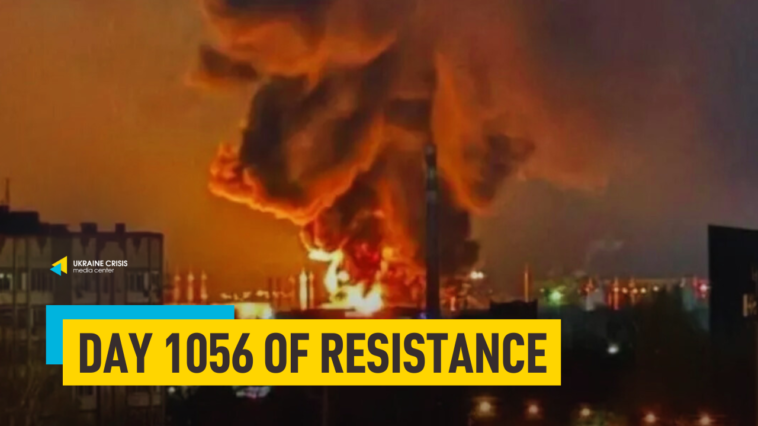Ukraine hits military, industrial sites across Russia overnight. Ukrainians favorable of EU, NATO with level of trust declining, poll finds. NATO chief to Europe: Spend more on defense or learn Russian.
Ukraine hits military, industrial sites across Russia overnight
The Ukrainian General Staff said the country’s military had struck between 200 and 1,100 km deep inside Russia overnight on Tuesday, targeting an oil storage, refinery, chemical and ammunition plants in the Bryansk, Saratov, Tula and Tatarstan regions.
A massive fire erupted at the Aleksin chemical plant in the Tula region following a drone attack launched by Ukraine’s Security Service, the New Voice of Ukraine (NV) said, citing sources.
Ukraine hit the Kombinat Kristall oil depot in Engels, in the Saratov region. It attacked the same site last week, causing a huge fire that took five days to put out.
The drone attack struck a munitions storage facility holding guided bombs and cruise missiles at the Engels airbase in the Saratov region, causing a fire that was still burning on Tuesday morning, a source told NV.
The Ukrainian General Staff said attacks on the Saratov oil refinery and the Kazanorgsintez plant triggered fires.
The General Staff also said it had struck the Bryansk chemical plant, which it said produced ammunition for artillery, multiple launch rocket systems, aircraft, engineering ammunition and components for Kh-59 cruise missiles.
“Ukraine’s Security Service together with other branches of Ukraine’s defense forces continues to target hostile military sites and industrial plants that are part of Russia’s military industrial complex. Each strike on ammunition depots, oil refineries, oil depots or chemical plants represents a painful hit to Russia’s ability to wage a war in Ukraine,” the source told NV.
Last night was “a fiery one” for a number of Russian military sites across the country, it added.
On January 8, Ukraine struck a Russian oil depot that serves a military airfield in the city of Engels, in Russia’s Saratov region, the General Staff of the Armed Forces of Ukraine said. It reported multiple explosions and a big fire at the Kombinat Kristall oil depot, which it said provided fuel to the Engels-2 military airfield, where Russia’s strategic bomber fleet is based. The fire at the oil depot was put out five days after the drone strike.
Ukrainians favorable of EU, NATO with level of trust declining, poll finds
The Kyiv International Institute of Sociology (KIIS) polled Ukrainians three times throughout 2024, asking their stance on Ukraine’s EU and NATO membership. More specifically it asked Ukrainians if they want their country to join the EU and NATO (in May), if they are ready to vote on a referendum on it (in September), and if they trust these institutions (in December).
Ninety per cent of Ukrainians want to see their country join the EU, the survey found. Support for NATO membership is at 84 per cent. “The data demonstrates Ukrainians’ absolute commitment to Euroatlantic integration,” the pollster said in a statement accompanying the survey.
If a referendum were held on joining the EU, 68 per cent would vote to join the bloc. The same share of Ukrainians (68 per cent) would vote to join NATO on a referendum. Nine and 10 per cent respectively would vote against accession.
Ukraine joining NATO (46 per cent) is seen as more of a priority than the country’s EU accession (22 per cent), the poll found.
The EU and NATO have a positive trust-mistrust balance.
“A large share of Ukrainians have doubts about Ukraine joining the EU and NATO. Nevertheless, they see Ukraine as member of the blocs,” KIIS said.
NATO chief to Europe: Spend more on defense or learn Russian
The EU needs to rethink its spending priorities to boost defense budgets, NATO Secretary General Mark Rutte told the European Parliament on Monday. He said NATO’s current target for members’ defense spending — two percent of their country’s GDP, is not enough to keep them safe in four or five years.
“I’m deeply concerned about the security situation in Europe. We are not at war, but we are not at peace either,” Rutte said.
“The good news is that we know what to do to protect our people and way of life now and in the long term, we just need to do it. That means we need to invest more in defense and produce more capabilities. This cannot wait. We need to boost the resilience of our societies and critical infrastructure,” he continued.
“NATO Allies have certainly increased defense spending. Two thirds are now spending at least two per cent of GDP on defense, and and I very much welcome their efforts. But to be honest, two per cent is not nearly enough,” Rutte said.
“To stay safe in the years to come, Allies will need to spend considerably more than two per cent. But generally speaking, spending more on defense means spending less on other priorities, but it can make a big difference for our future security,” he added.
“The two per cent is not nearly enough. We are safe now, but not in four or five years,” he said, adding later that if spending doesn’t go up Europeans should “get out your Russian language courses or go to New Zealand.”
Rutte also said Europe should not rely entirely on the U.S. for defense and it should increase its defense spending.
Last week, the U.S. President-elect Donald Trump called on allies to spend 5 percent of GDP on defense.

